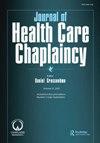生命尽头的精神关怀质量:家人对爱人的期望
IF 1.1
Q4 HEALTH POLICY & SERVICES
引用次数: 2
摘要
生命末期精神护理(EOL)是任何地区三级急症护理医院的“基石”投资。精神护理部门需要展示在EOL提供精神护理的质量指标,不仅要为他们的病人,而且要满足家属对他们所爱的人的护理的期望。采用电话结构化访谈的固定选择调查工具对202个丧失亲人的标准家庭进行了调查。(1)家庭保留了传统的司铎/礼仪(78.6%)和牧养/牧羊人(67.5%)的牧师角色期望;(2)期望在EOL之后扩大牧师的角色(50%);(3)传统的精神关怀服务,无论宗教或灵性:安慰和关怀,情感支持(96%);积极倾听(96.5%);牧师提醒上帝的存在(93.6%);祷告(96%);读经(69.3%);以及病人的仪式/圣礼恩膏(71.3%)。本文章由计算机程序翻译,如有差异,请以英文原文为准。
Quality of Spiritual Care at the End of Life: What the Family Expects for Their Loved One
Spiritual care at the End of Life (EOL) is a “keystone” investment at any Regional Tertiary Acute Care Hospital. Spiritual Care Departments need to demonstrate quality indicators in the provision of spiritual care at an EOL not only for their patients, but to satisfy family expectations of that care for their loved one. A fixed choice survey instrument using a structured interview via telephone was utilized for 202 criterion families who had lost a loved one. Three domains surfaced: (1) Families retained traditional chaplain role expectations of Priestly/Liturgical (78.6%) and Pastoral/Shepherd (67.5%); (2) Expectations of an expanded chaplain role after the EOL (50%); and, (3) Traditional spiritual care services regardless of one’s religion or spirituality: Comfort and care, emotional support (96%); active listening (96.5%); the Chaplain as a reminder of God’s presence (93.6%); prayer (96%); scripture reading (69.3%); and ritual/sacramental anointing of the sick (71.3%).
求助全文
通过发布文献求助,成功后即可免费获取论文全文。
去求助
来源期刊

Journal of Health Care Chaplaincy
HEALTH POLICY & SERVICES-
CiteScore
2.90
自引率
21.10%
发文量
29
期刊介绍:
The Journal of Health Care Chaplaincy publishes peer-reviewed, scholarly articles based on original research, quality assurance/improvement studies, descriptions of programs and interventions, program/intervention evaluations, and literature reviews on topics pertinent to pastoral/spiritual care, clinical pastoral education, chaplaincy, and spirituality in relation to physical and mental health.
 求助内容:
求助内容: 应助结果提醒方式:
应助结果提醒方式:


